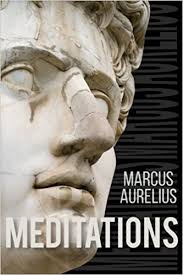Meditations Page #11
Meditations is a series of personal writings by Marcus Aurelius, Roman Emperor from 161 to 180 AD, recording his private notes to himself and ideas on Stoic philosophy. Marcus Aurelius wrote the 12 books of the Meditations in Koine Greek as a source for his own guidance and self-improvement.
V. Do nothing against thy will, nor contrary to the community, nor without due examination, nor with reluctancy. Affect not to set out thy thoughts with curious neat language. Be neither a great talker, nor a great undertaker. Moreover, let thy God that is in thee to rule over thee, find by thee, that he hath to do with a man; an aged man; a sociable man; a Roman; a prince; one that hath ordered his life, as one that expecteth, as it were, nothing but the sound of the trumpet, sounding a retreat to depart out of this life with all expedition. One who for his word or actions neither needs an oath, nor any man to be a witness. VI. To be cheerful, and to stand in no need, either of other men's help or attendance, or of that rest and tranquillity, which thou must be beholding to others for. Rather like one that is straight of himself, or hath ever been straight, than one that hath been rectified. VII. If thou shalt find anything in this mortal life better than righteousness, than truth, temperance, fortitude, and in general better than a mind contented both with those things which according to right and reason she doth, and in those, which without her will and knowledge happen unto thee by the providence; if I say, thou canst find out anything better than this, apply thyself unto it with thy whole heart, and that which is best wheresoever thou dost find it, enjoy freely. But if nothing thou shalt find worthy to be preferred to that spirit which is within thee; if nothing better than to subject unto thee thine own lusts and desires, and not to give way to any fancies or imaginations before thou hast duly considered of them, nothing better than to withdraw thyself (to use Socrates his words) from all sensuality, and submit thyself unto the gods, and to have care of all men in general: if thou shalt find that all other things in comparison of this, are but vile, and of little moment; then give not way to any other thing, which being once though but affected and inclined unto, it will no more be in thy power without all distraction as thou oughtest to prefer and to pursue after that good, which is thine own and thy proper good. For it is not lawful, that anything that is of another and inferior kind and nature, be it what it will, as either popular applause, or honour, or riches, or pleasures; should be suffered to confront and contest as it were, with that which is rational, and operatively good. For all these things, if once though but for a while, they begin to please, they presently prevail, and pervert a man's mind, or turn a man from the right way. Do thou therefore I say absolutely and freely make choice of that which is best, and stick unto it. Now, that they say is best, which is most profitable. If they mean profitable to man as he is a rational man, stand thou to it, and maintain it; but if they mean profitable, as he is a creature, only reject it; and from this thy tenet and conclusion keep off carefully all plausible shows and colours of external appearance, that thou mayest be able to discern things rightly. VIII. Never esteem of anything as profitable, which shall ever constrain thee either to break thy faith, or to lose thy modesty; to hate any man, to suspect, to curse, to dissemble, to lust after anything, that requireth the secret of walls or veils. But he that preferreth before all things his rational part and spirit, and the sacred mysteries of virtue which issueth from it, he shall never lament and exclaim, never sigh; he shall never want either solitude or company: and which is chiefest of all, he shall live without either desire or fear. And as for life, whether for a long or short time he shall enjoy his soul thus compassed about with a body, he is altogether indifferent. For if even now he were to depart, he is as ready for it, as for any other action, which may be performed with modesty and decency. For all his life long, this is his only care, that his mind may always be occupied in such intentions and objects, as are proper to a rational sociable creature. IX. In the mind that is once truly disciplined and purged, thou canst not find anything, either foul or impure, or as it were festered: nothing that is either servile, or affected: no partial tie; no malicious averseness; nothing obnoxious; nothing concealed. The life of such an one, death can never surprise as imperfect; as of an actor, that should die before he had ended, or the play itself were at an end, a man might speak. X. Use thine opinative faculty with all honour and respect, for in her indeed is all: that thy opinion do not beget in thy understanding anything contrary to either nature, or the proper constitution of a rational creature. The end and object of a rational constitution is, to do nothing rashly, to be kindly affected towards men, and in all things willingly to submit unto the gods. Casting therefore all other things aside, keep thyself to these few, and remember withal that no man properly can be said to live more than that which is now present, which is but a moment of time. Whatsoever is besides either is already past, or uncertain. The time therefore that any man doth live, is but a little, and the place where he liveth, is but a very little corner of the earth, and the greatest fame that can remain of a man after his death, even that is but little, and that too, such as it is whilst it is, is by the succession of silly mortal men preserved, who likewise shall shortly die, and even whiles they live know not what in very deed they themselves are: and much less can know one, who long before is dead and gone.
Translation
Translate and read this book in other languages:
Select another language:
- - Select -
- 简体中文 (Chinese - Simplified)
- 繁體中文 (Chinese - Traditional)
- Español (Spanish)
- Esperanto (Esperanto)
- 日本語 (Japanese)
- Português (Portuguese)
- Deutsch (German)
- العربية (Arabic)
- Français (French)
- Русский (Russian)
- ಕನ್ನಡ (Kannada)
- 한국어 (Korean)
- עברית (Hebrew)
- Gaeilge (Irish)
- Українська (Ukrainian)
- اردو (Urdu)
- Magyar (Hungarian)
- मानक हिन्दी (Hindi)
- Indonesia (Indonesian)
- Italiano (Italian)
- தமிழ் (Tamil)
- Türkçe (Turkish)
- తెలుగు (Telugu)
- ภาษาไทย (Thai)
- Tiếng Việt (Vietnamese)
- Čeština (Czech)
- Polski (Polish)
- Bahasa Indonesia (Indonesian)
- Românește (Romanian)
- Nederlands (Dutch)
- Ελληνικά (Greek)
- Latinum (Latin)
- Svenska (Swedish)
- Dansk (Danish)
- Suomi (Finnish)
- فارسی (Persian)
- ייִדיש (Yiddish)
- հայերեն (Armenian)
- Norsk (Norwegian)
- English (English)
Citation
Use the citation below to add this book to your bibliography:
Style:MLAChicagoAPA
"Meditations Books." Literature.com. STANDS4 LLC, 2025. Web. 24 Feb. 2025. <https://www.literature.com/book/meditations_76>.








Discuss this Meditations book with the community:
Report Comment
We're doing our best to make sure our content is useful, accurate and safe.
If by any chance you spot an inappropriate comment while navigating through our website please use this form to let us know, and we'll take care of it shortly.
Attachment
You need to be logged in to favorite.
Log In